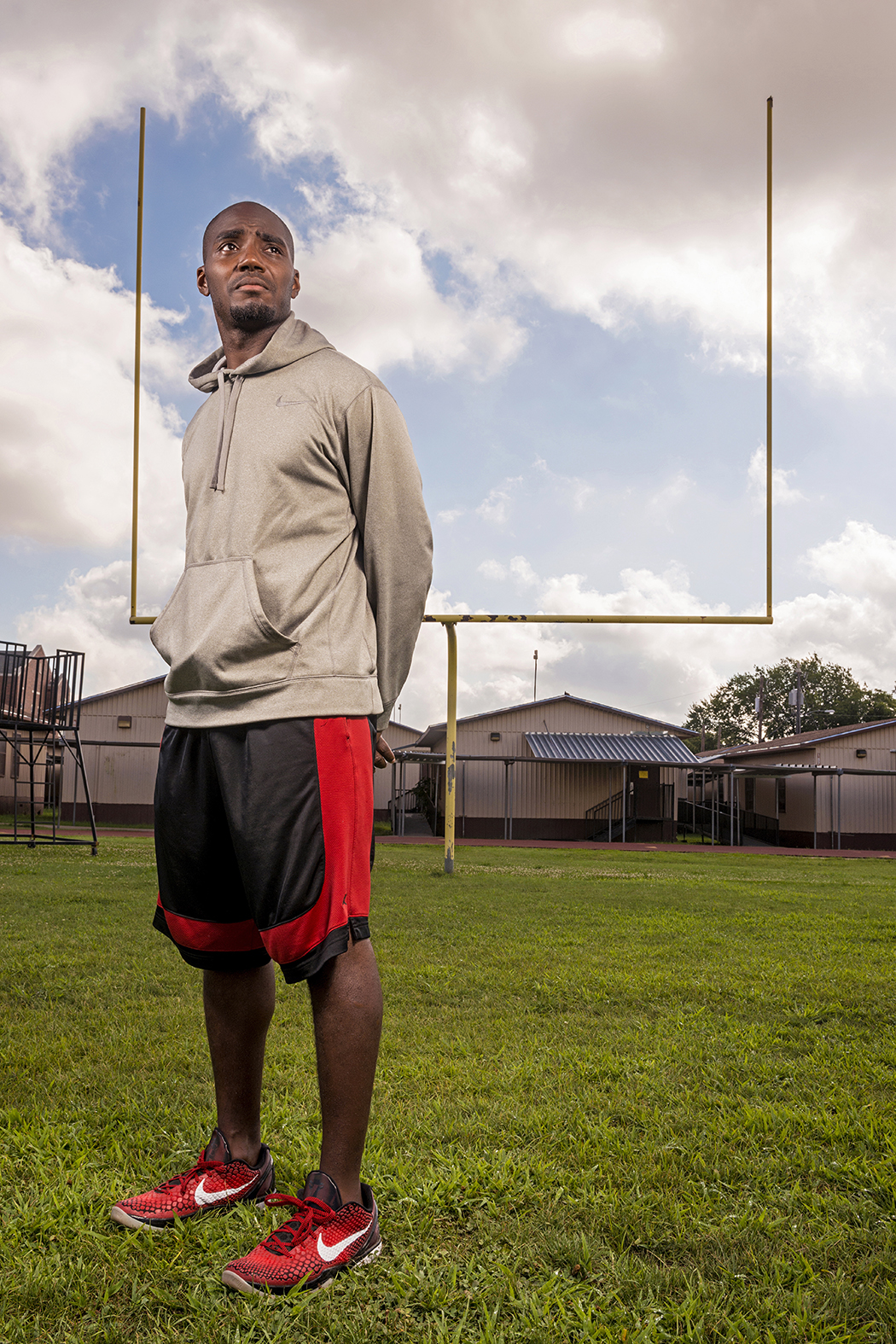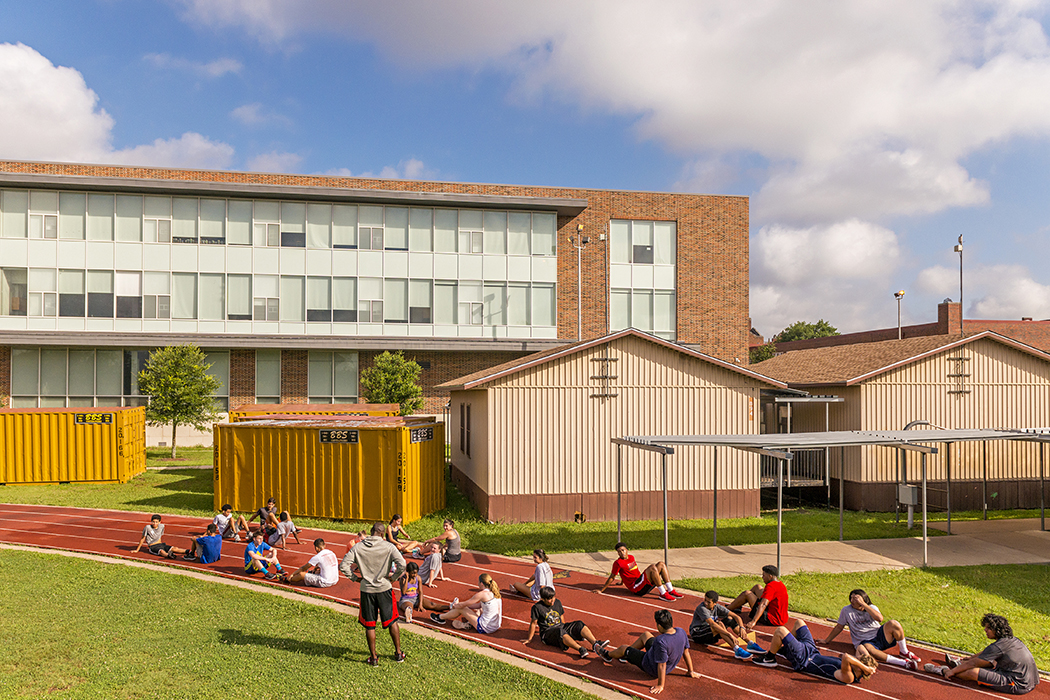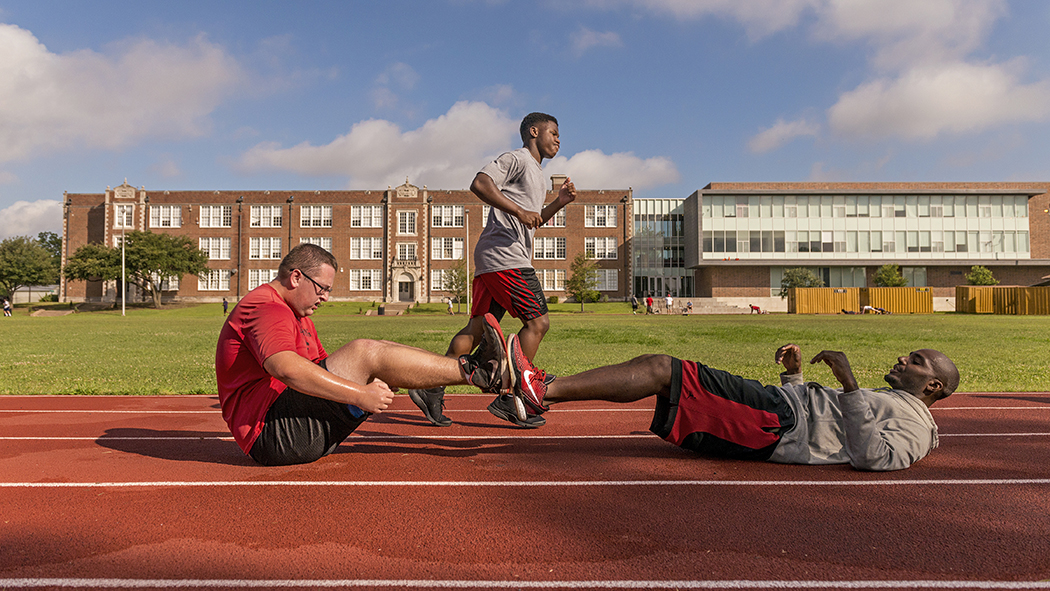
(Photo by Danny Fulgencio)
Bring in the big leagues
C.J. Wilson’s childhood home didn’t have running water. To take a shower, he walked down to a truck stop along Interstate 20. He showered among the truckers. The nearly mile-long walk back home made him as sweaty and dirty as he was when he left.
His single mother’s ailing health meant she couldn’t work. Food was scarce, but Wilson calls her his superhero. “I tear up because I think about the days she would go to sell whatever she had at the flea market, just for us,” he says, his voice choked with emotion.
It was football that provided a path forward. First at Baylor, then all the way to the Dallas Cowboys. These days, he tries to be the strong male role model and father figure he never had as a football coach and teacher at Woodrow Wilson High School.
During Wilson’s own high school years, he was a third-string cornerback on the freshman football team. After another cornerback made a gaffe, Wilson boldly approached the coach to say, “If I was in, that wouldn’t happen.”
While he doesn’t recommend that strategy to his players, it worked, and he was called into the game to show his undeniable talents.
Wilson’s early success went to his head. His poor attitude got him thrown off the team, meaning he missed the crucial sophomore and junior playing seasons when colleges begin to track talent. By senior year, he swallowed his pride and begged to be let back on the field.
“I love sweets, but there was nothing sweet about humble pie,” he says
He didn’t let his coach down, earning defensive district MVP and scholarship offers from Texas, OU, Baylor and Georgia Tech. Bob Stoops of OU, Mack Brown of Texas and former Cowboys coach Chan Gailey (who coached Georgia Tech at the time) all paid Wilson a visit.
“It was the best worst thing ever,” he says of his recruitment.
Despite Baylor’s poor athletic reputation at the time, he saw the potentila to help the Waco institution.
“God was sending me as a light into a dark place,” he says, “and I thought, ‘Am I losing my mind?’ ”
It proved to be a painful few years up until his final season, in 2006.
“The team was terrible,” Wilson says.
Everyone knew it, from the other teams they faced, to the guys in his own locker room. The negativity stung Wilson, who, like most freshmen, saw little time on the field his first year.

C.J. Wilson works through the summer keeping Woodrow athletes fit. (Photo by Danny Fulgencio)

C.J. Wilson thrives when he has a chance to work with young people. (Photo by Danny Fulgencio)
The next year, walking pneumonia left him near death with a lung full of fluid. By junior year, he was ready to shine as a team starter. He was named one of the best defensive backs in the country.
But the success wasn’t always sweet. Black students were rare on campus, while racism was not.
Hatred found its way to the front door of his apartment. “I used to get ‘I hate you nigger,’ handwritten and typed notes, outside my door,” he says of being harassed at his apartment. “Before games, other notes would say, ‘Go back to coon county.’ And I would have to perform for those same people who said that.”
While he never lacked confidence, he avoided a lot of the social scene that troubles many athletes in college.
“I don’t think I went to one party in college,” he says. “People thought I just came to play football and then went home to a different town.”
His talents on the field buoyed him into the professional spotlight when he was drafted to the Carolina Panthers in 2006. “I will be the water boy if you need me to be,” he told his coach, John Fox, at the time.
Wilson says life in the NFL isn’t as glamorous as what is portrayed on TV.
“You have no ‘you’ time,” he says. “Every minute was scheduled, from the moment you wake up until the moment you sleep. It is planned out. You couldn’t go to the store or go out to have a nice dinner, without being bothered.”
An NFL career, while lucrative, proved to have its own set of challenges. Wilson was asked to sign napkins and even breasts, and once was given a lock of a fan’s hair. Despite the pressure of the team, coaches and fan base, Wilson remained a role model.
“I knew I couldn’t mess up,” he says. “All these little kids — what happens when they see me doing something stupid?”
The child who grew up dirt poor with a single parent was now in the position to take care of his own mother. He found relief in ”Seeing the light in my mom’s eyes, knowing she didn’t have to worry about anything at that point.”
Unlike many professional athletes, he used his money wisely and only on his family. He put three cousins through college and threw many a graduation party.
With the larger bank account came added pressure from relatives. He even had money stolen directly from his account by a family member who worked in finance. “I met brothers and cousins I never knew existed, all with new business opportunities,” he says. “I asked one man, ‘Where were you when we couldn’t eat? When our house had no water and our house was 98 degrees?’ ”
It wasn’t much easier on the field. His first game was against Super Bowl champion and future Hall-of-Famer Brett Favre. When he was traded to the Cowboys in 2011, the pressure was immediate when he was given the locker once held by All-Star and Hall-Of-Famer Deion Sanders
When his wife became pregnant, Wilson changed. He didn’t want his daughter to see him as a football player but rather as her father. Following his NFL career, Wilson went back to Baylor to finish his degree, where he was on the dean’s list and majored in history. He was the first Baylor Football Legend named in the new stadium at Waco.
After graduation, he returned to Dallas to fulfill his lifelong dream of coaching youth football. When word got out, he was recruited once again, fielding more than 40 phone calls from schools interested in locking him down. It was Kyle Richardson, the former Woodrow principal, who wooed Wilson into picking the Wildcats.
“Coaching is always what I wanted to do,” he says.
He loves his job, made clear when he turned down a coaching position with the Chicago Bears to stay at Woodrow. “I feel like I have 200 sons and daughters. They come to you and they share stuff they are afraid to tell their parents,” he says.
Travis West, a rising senior receiver and defensive back at Woodrow, has thrived under Wilson’s coaching style. “Coach Wilson has taught me that true greatness is inside me. He has taught me how to be the best me when I play,” West says.
“Coach Wilson has taught me how to approach all my issues in life differently.”
While Wilson expects this season to be “epic” with his sights firmly set on the state championship, he isn’t just about football. Faith has always been a guiding force.
He recently penned the book “Biblical Black History,” highlighting the unsung roles of black men and women throughout time from a Biblical perspective. He spends much of his off-time traveling to different churches to speak.
Wilson also has reveled in the chance to be the father he never had. He and his college sweetheart, Caryn, welcomed daughter Cara two years ago.
“My daughter is terrible and I love it,” he says of her frequent shenanigans. “She can always come home to daddy. The first time I heard ‘daddy,’ I cried.”
While football has defined much of his professional life, he hopes it never defines him.
“The game changed my life, it didn’t become it,” he says.
“I never wanted to be seen as a good football player. I want to be seen as a good man.”





